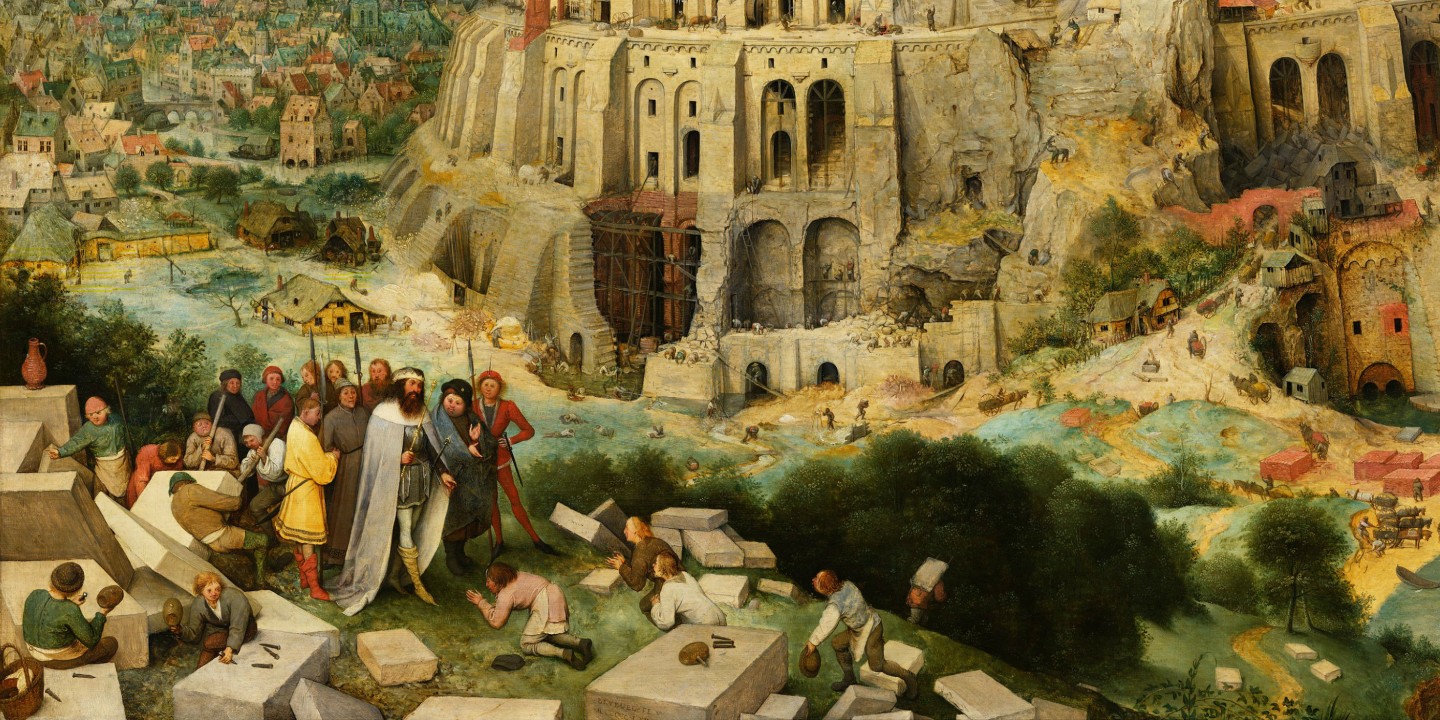The Babel story is about the dangers of uniformity
Forget the tower. The problem is that everyone "had the same words."

The Tower of Babel story is among the best known and most frequently cited stories in the Torah. And yet most of the conventional interpretations of the narrative are, I think, mistaken.
Genesis 11 is not a simple morality tale about a human attempt to storm the heavens and displace God. Nor, conversely, is it a primitive allegory about an insecure deity who is so threatened by human achievement that God needs to wreak havoc on the best-laid human plans. The narrative is also not placed where it is in the Torah in order to explain the vast multiplicity of human languages. Nor is it a lament about some lost primeval unity. The story of Babel is, I would suggest, about something else: the importance of individuals and the horrors of totalitarianism.
The fact that the nine verses that make up the narrative are often described as the “Tower of Babel” story is misleading, since the crime of the builders at Babel is not their desire to build a tower. “A tower with its top in the sky” (Gen. 11:4) is not, in and of itself, any kind of assault on God’s authority. The term is, rather, simply a biblical Hebrew expression for a very tall building, what we would similarly call a “skyscraper”—it does not actually scrape the sky; it is just extremely tall.
Read our latest issue or browse back issues.
If we read closely, the text itself tells us that the tower is not the issue: “Thus the Lord scattered them from there over the face of the whole earth; and they stopped building the city” (Gen. 11:8). It seems clear, therefore, as Victor Hamilton writes in his commentary on Genesis, that “the building of the city, and not the tower per se, [is what] provoked the divine displeasure.”
So why does the construction of the city disturb God so much? The punishment that God metes out to the builders offers a clue. In an otherwise brief and laconic story, we are nevertheless told twice that God scattered the builders “over the face of the whole earth” (Gen. 11:8, 9). But there is something odd about this. When God created the first man and woman, God blessed them: “Be fertile and increase, fill the earth” (1:28). And after the flood, God blessed Noah by reiterating the very same words: “Be fertile and increase, and fill the earth” (9:1). If a key part of God’s primordial blessing and charge to humanity is that we spread out and fill the earth, how can God’s scattering humanity be a punishment?
It isn’t, exactly. God’s foundational blessing, coupled with God’s interruption of the builders’ plans, may offer us a first glimpse of what’s wrong with their behavior. God had made it clear that the divine vision is for humanity to spread out and fill the earth, yet the builders want to stay put, to congregate in one place. In fact their resistance to God’s blessing is clear: they explicitly declare their intention to build their city, and the tower within it, out of fear “lest we be scattered all over the world” (Gen. 11:4). What they most fear is what God most wants.
God’s “punishment,” then, may not ultimately be a punishment at all, but a reaffirmation of the initial divine blessing in the face of human refusal and obstruction. What this story ends with, then, is not just judgment but also, and primarily, “an enforced return to the path of blessing.”
But why is the builders’ desire to stay huddled together in one place so problematic? And, conversely, why is God so committed to dispersing people in the first place?
The first verse of our story is telling: “Everyone on earth had the same language and the same words” (Gen. 11:1). Genesis starts out describing what seems like a story of human unity, of people living together and successfully communicating with one another. Considering that the story is usually regarded as a tale of human failure, failure so profound that God feels it necessary to put a stop to people’s labors, this seems like a strange way to begin. What’s so bad about human unity? Isn’t it a worthy aspiration?
A great deal depends how we understand unity. If everyone speaks “the same language” and utilizes “the same words,” then perhaps by implication they think the same thoughts and hold the same opinions. Perhaps, then, this story isn’t really about unity but about uniformity, which is much different.
Rabbi Naftali Tzvi Yehudah Berlin (commonly known as the Netziv, 1816–93) observes that although the opening verse tells us that the builders all had “the same words,” it never tells us anything about what those words actually were. That, he argues, is precisely the point: “God was not distressed by what they said, but by the fact that their words [and by implication, their thoughts] were all the same” (Ha’amek Davar to Gen. 11:1). God finds this unanimity alarming, because total uniformity is necessarily a sign of totalitarian control—after all, absolute consensus does not happen naturally on any matter, let alone on every matter.
Soon enough, the Netziv tells us, God’s concerns prove to be well founded: the builders refuse to let anyone leave their city (“lest we be scattered all over the world”). “This was certainly related to the ‘same words’ they all shared,” the Netziv argues. “They feared that since not all human thoughts are alike, if some would leave they might adopt different thoughts. And so they saw to it that no one left their enclave.”
The builders wanted Babel to be the capital of the world, the Netziv contends, and the center of ideological enforcement: “It is inconceivable that there would be only one city in the whole world. Rather, they thought that all cities would be connected and subsidiary to that one city in which the tower was to be built.” This enforced consensus, he says, explains the building of the tower: the skyscraper would serve as a watchtower from which to monitor the residents and keep them in line (Ha’amek Davar to Gen. 11:4).
An inevitable consequence of uniformity is anonymity. If everyone says the same words and thinks the same thoughts, then a society emerges in which there is no room for individual tastes, thoughts, and aspirations or for individual projects and creativity. All difference is (coercively) erased. The text before us, and the larger context in Genesis where it is found, signal that this is precisely what happened at Babel.
Strikingly, no names are mentioned in the story of Babel—there are no names because there are no individuals. This is especially ironic (and tragic) in light of the people’s express wish to “make a name” for themselves (Gen. 11:4).
Immediately before our story, we read a long genealogy of Noah’s various children, and their children, and their children after them; we are bombarded with names (Gen. 10:1–32). And what comes right after our story? Another long genealogy, with another proliferation of names (11:10–30). Adding irony to irony, this second genealogy, immediately following our nameless story, begins by saying: “This is the line of [Noah’s] son Shem” (11:10). Shem means “name” in Hebrew; contemporary interpreter Judy Klitsner points out that in order to make sure we notice that the story we have just read contains no individuals, the Torah hits us over the head by following our story with an introduction of a man named Name.
Let’s turn back to the first long genealogy, in chapter 10. This marathon of names interrupts itself repeatedly to let us know that cultural and linguistic diversity has already been achieved (10:5, 20, 31) and that people have already “branched out” and “scattered”—the same word for what the Babelites resist and God forcibly enacts (10:5, 18, 32). Compared with what follows, then, chapter 10 is like an ode to diversity, which is unmistakably part of the divine plan.
More important, the multiplicity and variegation reported in chapter 10 shed crucial light on chapter 11: our story is not about some primordial human unity being lost in the mists of time but, on the contrary, about an active attempt to undo a divine plan for diversity that has already begun to come to fruition. God’s dispersal of the people and multiplication of languages thus represent the restoration of blessings already in the process of being fulfilled.
When people are anonymous, they are reduced to insignificance. If no one is anyone in particular, then who cares what happens to them? The Talmudic sages poignantly dramatize this concern. According to Rabbi Pinhas, if one of the builders were to plummet to his death from the enormously tall tower, no one would pay any attention. But if one of the bricks were to fall and break, they would “sit and cry and lament: ‘When will we have another one to replace it?’” (Pirkei de-Rabbi Eliezer, 24). The builders care about the collective project. But the individuals who (in theory) make up the collective are utterly irrelevant; the value of their individual lives has been obliterated.
So which one is it—is the story of Babel about an attempted assault on God or about an all-out attack on human uniqueness? That is precisely the point: an attempt to root out human individuality is an assault on God. Jewish theology affirms that each and every human being is created in the image of God and that our uniqueness and individuality are a large part of what God treasures about us. To try and eradicate human uniqueness is to declare war on God’s image and thus to declare war on God. The story of Babel ends with God’s “reversing an unhealthy, monolithic movement toward imposed homogeneity,” writes Hamilton, and thus with God’s reaffirmation of the blessings of cultural, linguistic, and geographical diversity.
We should not make a fetish out of nonconformity, which can easily become just another form of narcissism and self-involvement. But neither can we ever accept enforced uniformity, the coupling of unanimity and anonymity that is the hallmark of totalitarian movements. We are relational, communal beings, and that is a fact to be cultivated and treasured. But we are also individuals, summoned to think and act for ourselves.
A version of this article appears in the November 8 print edition under the title “Tower of uniformity.” It is excerpted from Shai Held's just-published book The Heart of Torah (Vol. 1): Essays on the Weekly Torah Portion, Genesis and Exodus and used with permission of the Jewish Publication Society and the University of Nebraska Press. © 2017 by Shai Held.





